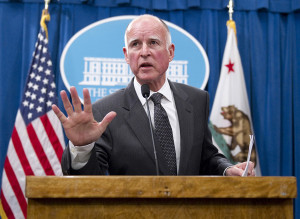
On August 25, Governor Jerry Brown announced a new job plan to help get Californians back to work as a result of backlash from his own party and the people of California about the rising unemployment.
Governor Brown is proposing a change to the state tax code that would essentially give tax breaks to companies that hire California workers.
Brown would also give businesses a 3 to 4 percent sales tax credit for new equipment they purchase in the state. Brown hopes this idea, which is an expansion on his budget proposal, will not only help create jobs in California but also bring more revenue to the state.
The new tax revenue will also release $1 billion the state was putting aside to use to avoid cuts in public services. This extra $1 billion will be used as business tax credits to help businesses hire new workers.
Because of the tax credits, Brown is confident he can pick up some Republican support.
“I can win support from the business community and get four or five Republican votes,” Brown told the Los Angeles Times. The Governor claims that he has a few Republican legislators behind him, though he would not name who the legislators were.
Publicly, the Republicans have shown little support for Brown’s idea.
Sen. Bob Huff (R-Walnut) told the Los Angeles Times that Brown’s proposal is just “window dressing” and said the governor is only interested in creating political influence for himself rather than creating good policy.
Democrats are standing behind Brown’s decision to change the current tax code California currently uses, which allows tax breaks for companies that move jobs out of state.
Brown is seeking to eliminate “outrageous and perverse” incentive that is hurting the state.
While nothing is permanent yet, Brown is hopeful this will be a better alternative to tax increases, though he is leaving options open.
“The path forward is not an easy one, because there is a strong resistance to tax increases,” Brown said.
“This is not an easy nut to crack,” Senate President Pro Tem Darrell Steinberg said. “These decisions need to be made over the next weeks, and certainly not too far into the fall.”
Experts like economist Christopher Thornberg believe the governor is right in trying to change the tax code. However, Thornberg is skeptical about how much that would affect the state’s unemployment rate, the second highest in the nation.
“If I told you I was going to give you a 4 percent discount on a new car, is that going to change your decision to buy?” said Thornberg, a principal at Beacon Economics, a consulting firm in Los Angeles. “This new credit will have some marginal impact, but will it dramatically alter the pace of the state’s economic recovery? Of course not.”
Brown said that if the plan goes through, this would be the first step, along with tax measures to be voted on in 2012, to the recovery of California’s gloomy financial situation.
















